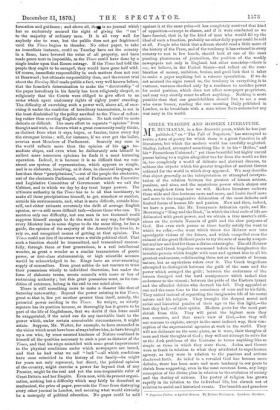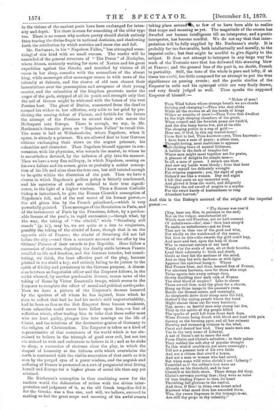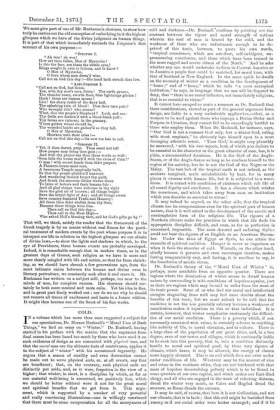GREEK TRAGEDY AND MODERN LITERATURE. Mt.BUe Hk AN : in a fine
dramatic poem which h h ehas just published on ta revive a form of poetry for which there is a great function in all literatures, but which the modern world has carefully neglected. Shelley, indeed, attempted something like it in his "Hellas," and his" Prometheus Unbound ;" yet these beautiful but highly unreal poems belong to a region altogether too far from the world we live in, too completely a world of delicate and abstract dreams, to achieve the objects which the greater tragedies of ancient Greece achieved for the world in which they appeared. We may describe that object generally as the interpretation or attempted interpre- tation of the relation between the greatest of human actions, passions, and aims, and the mysterious power which shapes our ends, rough-hew them how we will. Modern literature eschews these wide and dim horizons more and more, and limits itself more and more to the imaginative delineation of the most definite and limited forms of human life and passion. Now and then, indeed, we have a poem, like Mr. Tennyson's Arthurian cycle, and Mr. Browning's "Ring and the Book," in which the ideal ends of life are delineated with great power, and we obtain a true master's criti- cisms on the certain Nemesis of guilt and the slow purposes of Goi. But even such poems as these hardly satisfy the want to which we refer,—the want which threw the Hebrew seer into apocalyptic visions of the future, and which compelled even the calmest of the great Hellenic poets to try the acts of man by a super- natural law and find for them a divine catastrophe. The old Hebrew visions and Greek tragedies summoned before the imagination the invisible powers which fought with man and against him in all his greatest endeavours,—delineating them not as elements of human nature, but as mysterious rulers over it. The Greek tragedians attempted to distinguish between the guilt of the man and the power which avenged the guilt ; between the endurance of the human demigod and the hard omnipotence which tasked that endurance to the utmost ; between the pride of the Eastern tyrant and the offended deities who decreed his fall. They appealed at one and the same time to the conscience of man and to his faith. They united instead of separating the imaginative life of his moral nature and his religion. They brought the deepest moral and social and historical puzzles of their age to the dim light,—the best they had,—of their spirits. Modern poets for the most part shrink from this. They will paint the highest man they can conceive, and that man's view of God,—but they will not venture to explain, except in the most indirect way, their con- ception of the supernatural agencies at work in the world. They will not delineate on the same plane, as it were, their thoughts of man and their thoughts of God ; they will not attempt to solve for us the dark problems of the Universe in terms anything like so simple as those in which they state them. Judea and Greece were as frank in relation to what they attributed to superhuman agency, as they were in relation to the passions and actions shadowed forth. As belief in a revealed God has become more definite, there has been more and more tendency in our poets to shrink from suggesting, even in the most reverent form, any large conception of the divine plan in relation to the evolution of society and the destiny of nations. The poetry of religion has grown rapidly in its relation to the individual life, but shrunk out of relation to social and historical events. The breadth and grandeur • Napoleon Fallen: a Lyrical Drama. By Robert Buchanan. London: Stratum.
in the visions of the ancient poets have been exchanged for inten- sity and depth. Yet there is room for something of the older type too. There is no reason why modern poetry should shrink entirely from tracing the divine finger in national destinies, and shadowing forth the retribution by which societies and races rise and fall.
Mr. Buchanan, in his "Napoleon Fallen," has attempted some- thing] of this kind with no small success. The reader will be reminded of the general structure of "The Persm" of 2Eschylus, where Atossa, anxiously waiting for news of Xerxes and his great expedition against the Greeks, and troubled by visions of ill omen in her sleep, consults with the counsellors of the absent king, while messenger after messenger comes in with news of the calamity at Salamis, and the chorus of old men chaunt their lamentations over the presumption and arrogance of their young master, and the calamities of the kingdom prostrate under the anger of the gods, stripped of all its youth and strength only that the soil of Greece might be whitened with the bones of the vast Persian host. The ghost of Darius, summoned from the dead to counsel his widow in her affliction, only adds to her grief by pre- dicting the coming defeat of Platx.m, and forbids for the future the attempt of the Persians to extend their rule across the Hellespont into Europe. There is enough, we say, in Mr. Buchanan's dramatic poem on "Napoleon Fallen" to recall this. The scene is laid at Wilhelmshiihe, where Napoleon, when it opens, is already a prisoner. We are allowed first to hear German citizens exchanging their views on the august prisoner, his calamities and character. Then Napoleon himself appears in con- versation with his physician, who wounds the master, to whom he is nevertheless devoted, by the infusion of pity into his manner. Then we have a very fine soliloquy, in which Napoleon, musing on his own failure and its causes, gives us probably a nobler concep- tion of his life and aims than the true one, but still tainted enough to be quite within the discretion of the poet. Then we have a chorus in which Napoleon's godless policy is bitterly condemned, and his mysteries of craft are reduced to their true signifi- cance, in the light of a higher wisdom. Then a Roman Catholic bishop is introduced, to give the Roman Church's conception of Napoleon's fall, and of the real secret of his former power,— the aid given him by the French priesthood,—which is very powerfully painted. Then messages of the Revolution in Paris, and of the investment of Paris by the Prussians, follow, by a pardon- able licence of the poet's, in rapid succession ;—though what, by the way, the taking of "time citadel," while "Strasburg still stands" (p. 4), may be, we are quite at a loss to conjecture, possibly the taking of the citadel of Leon, though that is on the opposite side of France ; the citadel of Strasburg did not fall before the city ;—and then a sarcastic account of the offer by the Orleans' Princes of their swords to he Republic. Here follow a succession of choruses, depicting the deadly strife between France recalled to life and freedom, and the German invader, but consti- tuting, we think, the least effective part of the play, because pitched in too shrill a key, and entirely failing to do justice to the spirit of fidelity and persistency in the German purpose. A discus- sion between an Imperialist officer and the Emperor follows, in the midst whereof, by another pardonable licence, comes news of the taking of Rome by Victor Emanuel's troops, which seems to the Emperor to complete the effect of moral and political earthquake. Then we have a picture of the Emperor's dreams haunted by the spectres of all whom he has injured, from which he rises to reflect that had he had his uncle's cold imperturbability, had he been as free as the first Emperor from human weakness, these calamities could never have fallen upon him,—a line of reflection which, after leading him to infer that those suffer most who are least guilty, plunges him into musings on the life of Christ, and the relations of the destructive genius of Germany to tle religion of Christendom. The Emperor is taken as a kind of representative of that conscience of the world which is too sin- stained to believe in the triumph of good over evil, but not too sin-stained to wish and endeavour to believe in it ; and as he sinks to sleep, a succession of choruses close the play, in which the despair of humanity at the hideous evils which overwhelm the earth is contrasted with the visible renovation of that earth as it is seen by the purged eyes of a purer wisdom, and the anguish and suffering of France is presented as a sort of purgatorial trial fitting herself and Europe for a higher phase of social life than any yet attained.
Mr. Buchanan's conception in thus combining anew for the modern world the delineation of action with the divine inter- pretation and judgment of it, as the old Greek tragedies did it for the Greeks, was a fine one, and will, we believe, succeed in making us feel the great scope and meaning of the awful events
taking place around., as few of us have been able to realize that scope and meaning as yet. The magnitude of the events has dwarfed our human intelligence till an interpreter, and a poetic interpreter, has become needful. We do not say that that inter- pretation will be fully supplied by Mr. Buchanan's study. It is probably far too favourable, both intellectually and morally, to the imperial exile ; but that might be needful to give dignity to the subject. It does not attempt to interpret in any large way the work of the Teutonic race that has delivered this stunning blow at France ; and the general bias of the poet is, no doubt, French to partiality. Still, the tone of the whole is pure and lofty, if at times too mile, too little composed for an attempt to put the true significance on passing events ; and the poetic studies of the Emperor in exile and his episcopal critic are very finely drawn,
and very firmly judged as well. Thus speaks the supposed Emperor of himself :—
" Maker of men!
Then Wind before whose strange breath we are clouds Driving and changing !—Thou who dost abide While all the crowns on all the heads of kings Wither as wreaths of snow!—Thou Voice that dwellest In the high sleeping chambers of the great, When council and the feverish pomp are hush'd, And the dim lamp burns low, and at its side
The sleeping potion in a cup of gold:—
Hear me, 0 God, in this my travail-hour! From first to last, Then knowest—yea, Thou knowest-
I have been a man of peace : a silent man, Thought-loving, most ambitious to appease
elf -chidingfears of mental littleness,
A builder in the dark of temples fair Where men might meet together not for praise, A planner of delights for simple men—
In all, a man of peace. I struck one blow, And saw my hands were bloody ; from that hour I knew myself too delicately wrought For crimson pageants ; yea, the sight of pain Sicken'd me like a woman. Day and night I felt that stain on my immortal soul, And gloved it from the world, and diligently Wrought the red sword of empire to a scythe For the swart hands of husbandman to reap Abundant harvest."
And this is the Bishop's account of the origin of the imperial power :—
" Thy throne was rear'd
(Nay, hear me, Sire, in patience to the end) Not on the vulgar, unsubstantial air Which men call Freedom, not on half-consent Of unbeliovers—tho', alas ! thou bast stoop'd To smile on unbelievers—not on lives That saw in thee one of the good and wise, Not wholly on the watchword of thy name ; Bat first on this—the swords thy gold could buy, And most and last, upon the help of those Who to remotest corners of our land Watch o'er the souls of men, sit at their hearths, Lend their solemnity to birth and death, Guide as they list the motions of the mind, And as they list with darkness or with light Appease the spiritual hunger. Where Had France been, and thou, boasted Sun of France, For nineteen harvests, save for those who crept Thine agents into every cottage door, Slowly distilling thro' each vein of France The vital blood of empire ? Like to slaves These served thee, used thy glory for a charm, Hung up thine image in the peasant's room Beside our blessed saints, and cunningly, As shepherds drive their sheep unto the fold, Gather'd thy crying people whore thy hand Might choose them out for very butchery. Nay, more ; as fearful men may stamp out fire, They in the spirits of thy people killed The sparks of peril left from those dark days, When France, being drunk with blood and mad with pain Sprang on the burning pyre, and all her raiment Burning and streaming crimson in the wind, Curst and denied her God. They made men see, Yea in the very name of Liberty, A net of Satan's set to snare the soul From Christ and Christ's salvation ; in their palms They welded the soft clay of popular thought To this wish'd semblance yet more cunningly ; Till not a peasant heir of his own fields And not a citizen that own'd a house, And not a man or woman who had saved, But when some wild voice shriek'd out 'Liberty !'
Trembled as if the robber's foot were set
Already on his threshold, and in fear Clutch'd at his little store. These things did they, Christ's servants serving thee ; they were as veins Of iron binding France to thee, its heart Throbbing fall glorious in the capital.
And thou, 0 Sire! in thine own secret mind Knowest what mood thou has accorded them, Who, thy sworn liegemen in thy triwziph-hour, Arc still thy props in thy calamity."
We must give part of one of Mr. Buchanan's choruses, to show how truly he carries out the old conception of embodying in it the highest glimpses which we have of the divine judgment on human things. It is part of that which immediately succeeds the Emperor's first account of his own purposes:— " STROPHE I.
"Ah woe! ah woe!
How art thou fallen, Man of Mysteries ! Is this the face, are these the subtle eyes,1 Kings sought in vain to fathom, and to know ? 0 Man of Mysteries, 0 thou whom men deem'd wise, Call not on God this day !—His hand bath struck thee low.
"ANTI-STROPHE I.
Call not on God, but listen.
Yea, with thy soul's ears, listen! The earth groans, The thunder roars, swords flash, blue lightnings glisten ! Hark! those are human moans!
List! the sharp rattle of the fiery hail, The splashing rain of blood ! Bost thou turn pale? Who wrought this? who atones?
What, thou the people's Shepherd ? Look, and see: Thy fields are darken'd with a blood-black pall ; Thy farms are ruinous; in the granary, Where golden wheat should be, The wounded lambs are gather'd as they fall. 0 Man of Mysteries, Hearken unto their cries !- Call not on God this day—'tis now too late to call.
" &moms IL
"Yet, if thou darest, pray. Thou canal not tell How prayer may bring thee gain ;— And with thy prayer say thou these words as well : 'Soon falls the house mark'd with the cross of Cain 0 man ! with secret hands thou didst prepare A Pleasure-house moat rare, A beauteous Temple magically built, So that thy people gladden'd unaware And wandering therein forgot thy guilt, And drank the amorous ditties woven there To lutes of lechers and their lemans fair : And all glad things were welcome in thy sight Save the glad air of heaven ; all things bright Save the bright light of day ; and all things sweet Save country-featured Truth and Honesty : All these thou didst abolish from thy Seat, Because these things were free.
Thou call on God this day— Thou call to the Most High—
Who asked Hell's blessing then, and let God's gifts go by !"
That will, we think, satisfy the reader that the framework of the Greek tragedy is by no means without real fitness for the poeti- cal treatment of modern events by the poet whose purpose it is to interpret our life in relation to the highest glimpses we can obtain of divine laws,—to show the lights and shadows in which, to the eye of Providence, these human events are probably enveloped. Indeed, it is remarkable enough that in modern times, as in the greatest days of Greece, such religion as we have is more and more closely mingled with life and action, so that far from shrink- ing, as we should have shrunk a few generations ago, from the most intimate union between the human and divine even in literary portraiture, we constantly seek after it and crave it. Mr. Buchanan has written on a subject still, perhaps, too near to the minds of men, for complete success. His choruses should cer- tainly be both more musical and more calm. Yet his idea is fine, and in great part finely worked out ; nor do we see why he should not remove all traces of excitement and haste in a future edition. It might then become one of the finest of his fine works.
61




































 Previous page
Previous page